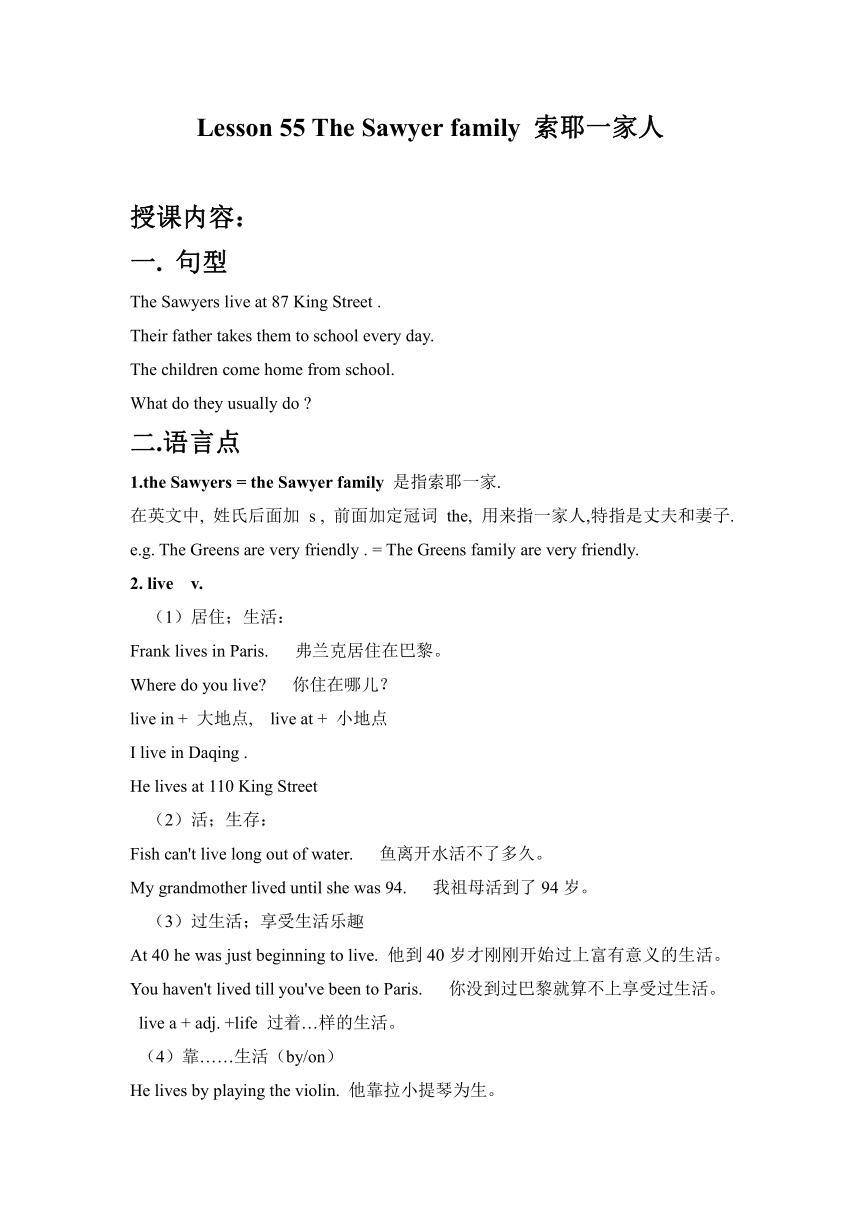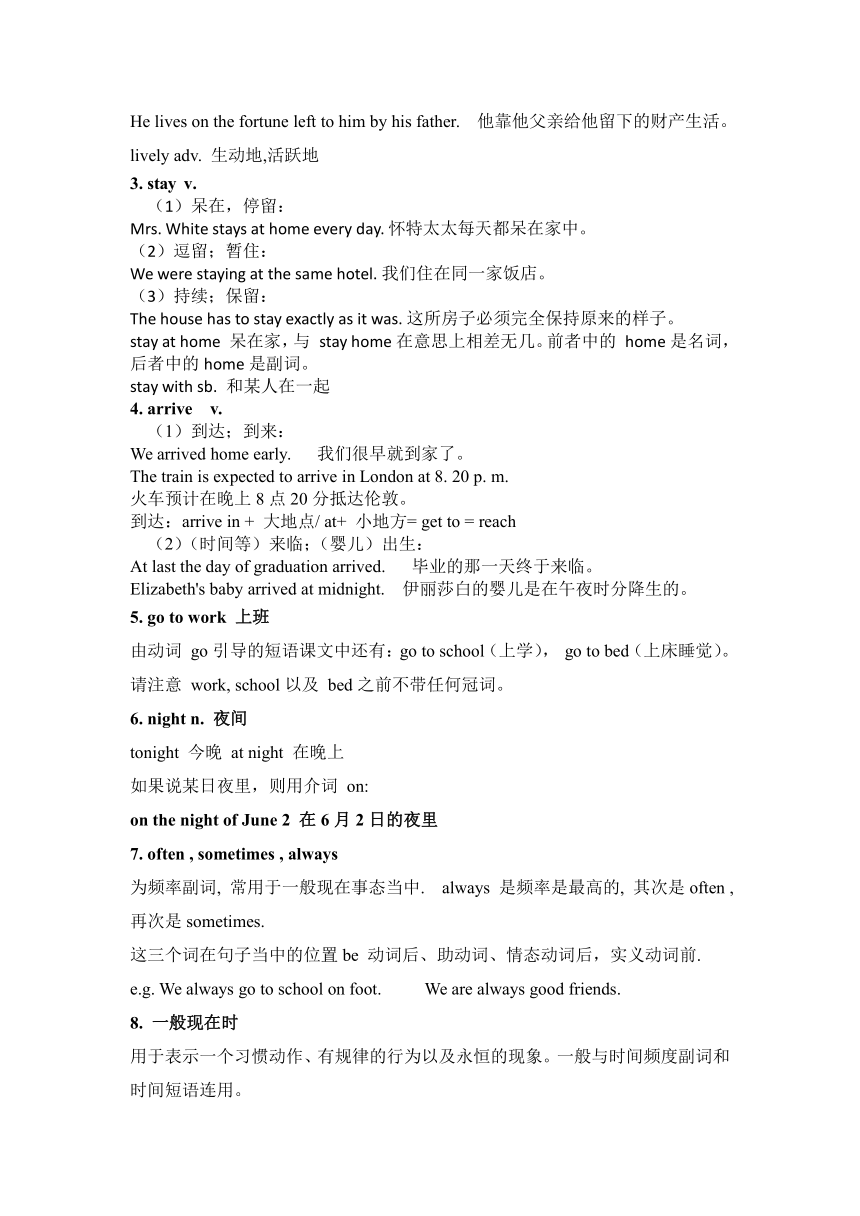新概念英语第一册 讲义 Lesson 55 The Sawyer family 索耶一家人
文档属性
| 名称 | 新概念英语第一册 讲义 Lesson 55 The Sawyer family 索耶一家人 |  | |
| 格式 | docx | ||
| 文件大小 | 20.6KB | ||
| 资源类型 | 教案 | ||
| 版本资源 | 新概念英语 | ||
| 科目 | 英语 | ||
| 更新时间 | 2024-01-21 16:22:50 | ||
图片预览


文档简介
Lesson 55 The Sawyer family 索耶一家人
授课内容:
一. 句型
The Sawyers live at 87 King Street .
Their father takes them to school every day.
The children come home from school.
What do they usually do
二.语言点
1.the Sawyers = the Sawyer family 是指索耶一家.
在英文中, 姓氏后面加 s , 前面加定冠词 the, 用来指一家人,特指是丈夫和妻子. e.g. The Greens are very friendly . = The Greens family are very friendly.
2. live v.
(1)居住;生活:
Frank lives in Paris. 弗兰克居住在巴黎。
Where do you live 你住在哪儿?
live in + 大地点, live at + 小地点
I live in Daqing .
He lives at 110 King Street
(2)活;生存:
Fish can't live long out of water. 鱼离开水活不了多久。
My grandmother lived until she was 94. 我祖母活到了94岁。
(3)过生活;享受生活乐趣
At 40 he was just beginning to live. 他到40岁才刚刚开始过上富有意义的生活。 You haven't lived till you've been to Paris. 你没到过巴黎就算不上享受过生活。
live a + adj. +life 过着…样的生活。
(4)靠……生活(by/on)
He lives by playing the violin. 他靠拉小提琴为生。
He lives on the fortune left to him by his father. 他靠他父亲给他留下的财产生活。
lively adv. 生动地,活跃地
3. stay v.
(1)呆在,停留:
Mrs. White stays at home every day. 怀特太太每天都呆在家中。
(2)逗留;暂住:
We were staying at the same hotel. 我们住在同一家饭店。
(3)持续;保留:
The house has to stay exactly as it was. 这所房子必须完全保持原来的样子。
stay at home 呆在家,与 stay home在意思上相差无几。前者中的 home是名词,后者中的home是副词。
stay with sb. 和某人在一起
4. arrive v.
(1)到达;到来:
We arrived home early. 我们很早就到家了。
The train is expected to arrive in London at 8. 20 p. m.
火车预计在晚上8点20分抵达伦敦。
到达:arrive in + 大地点/ at+ 小地方= get to = reach
(2)(时间等)来临;(婴儿)出生:
At last the day of graduation arrived. 毕业的那一天终于来临。
Elizabeth's baby arrived at midnight. 伊丽莎白的婴儿是在午夜时分降生的。
5. go to work 上班
由动词 go引导的短语课文中还有:go to school(上学), go to bed(上床睡觉)。请注意 work, school以及 bed之前不带任何冠词。
6. night n. 夜间
tonight 今晚 at night 在晚上
如果说某日夜里,则用介词 on:
on the night of June 2 在6月2日的夜里
7. often , sometimes , always
为频率副词, 常用于一般现在事态当中. always 是频率是最高的, 其次是often ,再次是sometimes.
这三个词在句子当中的位置be 动词后、助动词、情态动词后,实义动词前.
e.g. We always go to school on foot. We are always good friends.
8. 一般现在时
用于表示一个习惯动作、有规律的行为以及永恒的现象。一般与时间频度副词和时间短语连用。
这些时间短语有:every day/week/month/year 每日/周/月/年
in the morning/afternoon/evening 在上午/下午/晚上
at noon/night 在正午/夜里
9. 动词单三的变化规则:
1. 一般情况下在词尾加s . like --- likes
2. 以s, x, ch, sh 结尾的动词在词尾加
eg . wash---washes watch—watches pass- passes fix---fixes
3. 以辅音字母加y 结尾的词,变y 为i 加 es . baby –babies.
4. 以辅音字母加o 结尾的动词 加 es . go ----goes .
注意读音 在/f/,/t/,/k/,/p/ 等清辅音后读/S/. 在/s//z//d //t∫//∫/等破擦音后读/IZ/. 在浊辅音和元音后读/ Z/
三、 随堂练习practice
用所给词的适当形式填空
1. She usually __________her lunch at school. (eat)
2. We ____________an English test every week. (have)
3. What are you ____________tomorrow (do)
4. Look, the boy _____________on the road. (cry)
5. My father _____________very hard. (work)
6. Linda always ___________at home on Sundays. (stay)
7. The sun _____________in the east. (rise)
8. They often ___________kites in spring. (fly)
9. It's six o'clock. My mother _____________. (cook)
10. Mr. Sawyer sometimes _____________his newspaper at night. (read)
单项选择。
( ) 1. They arrive ___________late.
A.to home B.in home C.at home D.home
( ) 2. Mr. Black usually ___________in the morning every day.
A.is shaving B.shaves C.shave D.is going to shave
( ) 3. I live ___________my parents. Now we are having dinner _________at home.
A.together,with B.with,together C.at, with D.in,/
( ) 4. His sister often ____________the cupboard in the morning.
A.dust B.is dusting C.dusts D.is going to dust
( ) 5. Their father takes ___________to school.
A.they B.their C.theirs D.them
( ) 6. The Greens _____________83 ,Bridge Street.
A.live at B.lives at C.live in D.lives in
( ) 7. I have my lunch at home ___________noon.
A.in B.at C.in the D.at the
( ) 8. I like beef, but my wife____________.
A.doesn't B.don't C.is D.isn't
( ) 9. She ____________home at night.
A.stay B.stay at C.stays at D.stays
( ) 10. -Listen! What is Julia doing over there
- She ___________under a big tree.
A.sings B.is singing C.sing D.is going to sing
按要求改写句子。
1. My father goes to work every day. (变一般疑问句)
__________ _________father _________to work every day
2. The Sawyers live at 87 King Street. (对划线部分提问)
___________ ___________the Sawyers live
3. He makes the bed in the morning. (变否定句)
He __________ __________the bed in the morning.
4. They sometimes listen to the stereo in the evening. (对划线部分提问) __________ _________they sometimes ________in the evening
5. She usually types the letters in the afternoon. (对划线部分提问)
__________ __________she usually ___________the letters
根据中文补全单词
1.他总是在下午会见他的朋友。
He __________ __________his friends in the afternoon.
2.索耶先生和他的妻子正在看电视。
Mr. Sawyer and his wife ___________ ___________TV.
3.她每天都洗盘子。
She ___________ ___________ ____________every day.
4.在上午你的妈妈通常都做什么?
In the morning, what __________your mother __________ ___________
5.正在下雨,我们都呆在家。
It _______ _________, we _________ _________at home.
授课内容:
一. 句型
The Sawyers live at 87 King Street .
Their father takes them to school every day.
The children come home from school.
What do they usually do
二.语言点
1.the Sawyers = the Sawyer family 是指索耶一家.
在英文中, 姓氏后面加 s , 前面加定冠词 the, 用来指一家人,特指是丈夫和妻子. e.g. The Greens are very friendly . = The Greens family are very friendly.
2. live v.
(1)居住;生活:
Frank lives in Paris. 弗兰克居住在巴黎。
Where do you live 你住在哪儿?
live in + 大地点, live at + 小地点
I live in Daqing .
He lives at 110 King Street
(2)活;生存:
Fish can't live long out of water. 鱼离开水活不了多久。
My grandmother lived until she was 94. 我祖母活到了94岁。
(3)过生活;享受生活乐趣
At 40 he was just beginning to live. 他到40岁才刚刚开始过上富有意义的生活。 You haven't lived till you've been to Paris. 你没到过巴黎就算不上享受过生活。
live a + adj. +life 过着…样的生活。
(4)靠……生活(by/on)
He lives by playing the violin. 他靠拉小提琴为生。
He lives on the fortune left to him by his father. 他靠他父亲给他留下的财产生活。
lively adv. 生动地,活跃地
3. stay v.
(1)呆在,停留:
Mrs. White stays at home every day. 怀特太太每天都呆在家中。
(2)逗留;暂住:
We were staying at the same hotel. 我们住在同一家饭店。
(3)持续;保留:
The house has to stay exactly as it was. 这所房子必须完全保持原来的样子。
stay at home 呆在家,与 stay home在意思上相差无几。前者中的 home是名词,后者中的home是副词。
stay with sb. 和某人在一起
4. arrive v.
(1)到达;到来:
We arrived home early. 我们很早就到家了。
The train is expected to arrive in London at 8. 20 p. m.
火车预计在晚上8点20分抵达伦敦。
到达:arrive in + 大地点/ at+ 小地方= get to = reach
(2)(时间等)来临;(婴儿)出生:
At last the day of graduation arrived. 毕业的那一天终于来临。
Elizabeth's baby arrived at midnight. 伊丽莎白的婴儿是在午夜时分降生的。
5. go to work 上班
由动词 go引导的短语课文中还有:go to school(上学), go to bed(上床睡觉)。请注意 work, school以及 bed之前不带任何冠词。
6. night n. 夜间
tonight 今晚 at night 在晚上
如果说某日夜里,则用介词 on:
on the night of June 2 在6月2日的夜里
7. often , sometimes , always
为频率副词, 常用于一般现在事态当中. always 是频率是最高的, 其次是often ,再次是sometimes.
这三个词在句子当中的位置be 动词后、助动词、情态动词后,实义动词前.
e.g. We always go to school on foot. We are always good friends.
8. 一般现在时
用于表示一个习惯动作、有规律的行为以及永恒的现象。一般与时间频度副词和时间短语连用。
这些时间短语有:every day/week/month/year 每日/周/月/年
in the morning/afternoon/evening 在上午/下午/晚上
at noon/night 在正午/夜里
9. 动词单三的变化规则:
1. 一般情况下在词尾加s . like --- likes
2. 以s, x, ch, sh 结尾的动词在词尾加
eg . wash---washes watch—watches pass- passes fix---fixes
3. 以辅音字母加y 结尾的词,变y 为i 加 es . baby –babies.
4. 以辅音字母加o 结尾的动词 加 es . go ----goes .
注意读音 在/f/,/t/,/k/,/p/ 等清辅音后读/S/. 在/s//z//d //t∫//∫/等破擦音后读/IZ/. 在浊辅音和元音后读/ Z/
三、 随堂练习practice
用所给词的适当形式填空
1. She usually __________her lunch at school. (eat)
2. We ____________an English test every week. (have)
3. What are you ____________tomorrow (do)
4. Look, the boy _____________on the road. (cry)
5. My father _____________very hard. (work)
6. Linda always ___________at home on Sundays. (stay)
7. The sun _____________in the east. (rise)
8. They often ___________kites in spring. (fly)
9. It's six o'clock. My mother _____________. (cook)
10. Mr. Sawyer sometimes _____________his newspaper at night. (read)
单项选择。
( ) 1. They arrive ___________late.
A.to home B.in home C.at home D.home
( ) 2. Mr. Black usually ___________in the morning every day.
A.is shaving B.shaves C.shave D.is going to shave
( ) 3. I live ___________my parents. Now we are having dinner _________at home.
A.together,with B.with,together C.at, with D.in,/
( ) 4. His sister often ____________the cupboard in the morning.
A.dust B.is dusting C.dusts D.is going to dust
( ) 5. Their father takes ___________to school.
A.they B.their C.theirs D.them
( ) 6. The Greens _____________83 ,Bridge Street.
A.live at B.lives at C.live in D.lives in
( ) 7. I have my lunch at home ___________noon.
A.in B.at C.in the D.at the
( ) 8. I like beef, but my wife____________.
A.doesn't B.don't C.is D.isn't
( ) 9. She ____________home at night.
A.stay B.stay at C.stays at D.stays
( ) 10. -Listen! What is Julia doing over there
- She ___________under a big tree.
A.sings B.is singing C.sing D.is going to sing
按要求改写句子。
1. My father goes to work every day. (变一般疑问句)
__________ _________father _________to work every day
2. The Sawyers live at 87 King Street. (对划线部分提问)
___________ ___________the Sawyers live
3. He makes the bed in the morning. (变否定句)
He __________ __________the bed in the morning.
4. They sometimes listen to the stereo in the evening. (对划线部分提问) __________ _________they sometimes ________in the evening
5. She usually types the letters in the afternoon. (对划线部分提问)
__________ __________she usually ___________the letters
根据中文补全单词
1.他总是在下午会见他的朋友。
He __________ __________his friends in the afternoon.
2.索耶先生和他的妻子正在看电视。
Mr. Sawyer and his wife ___________ ___________TV.
3.她每天都洗盘子。
She ___________ ___________ ____________every day.
4.在上午你的妈妈通常都做什么?
In the morning, what __________your mother __________ ___________
5.正在下雨,我们都呆在家。
It _______ _________, we _________ _________at home.
同课章节目录
